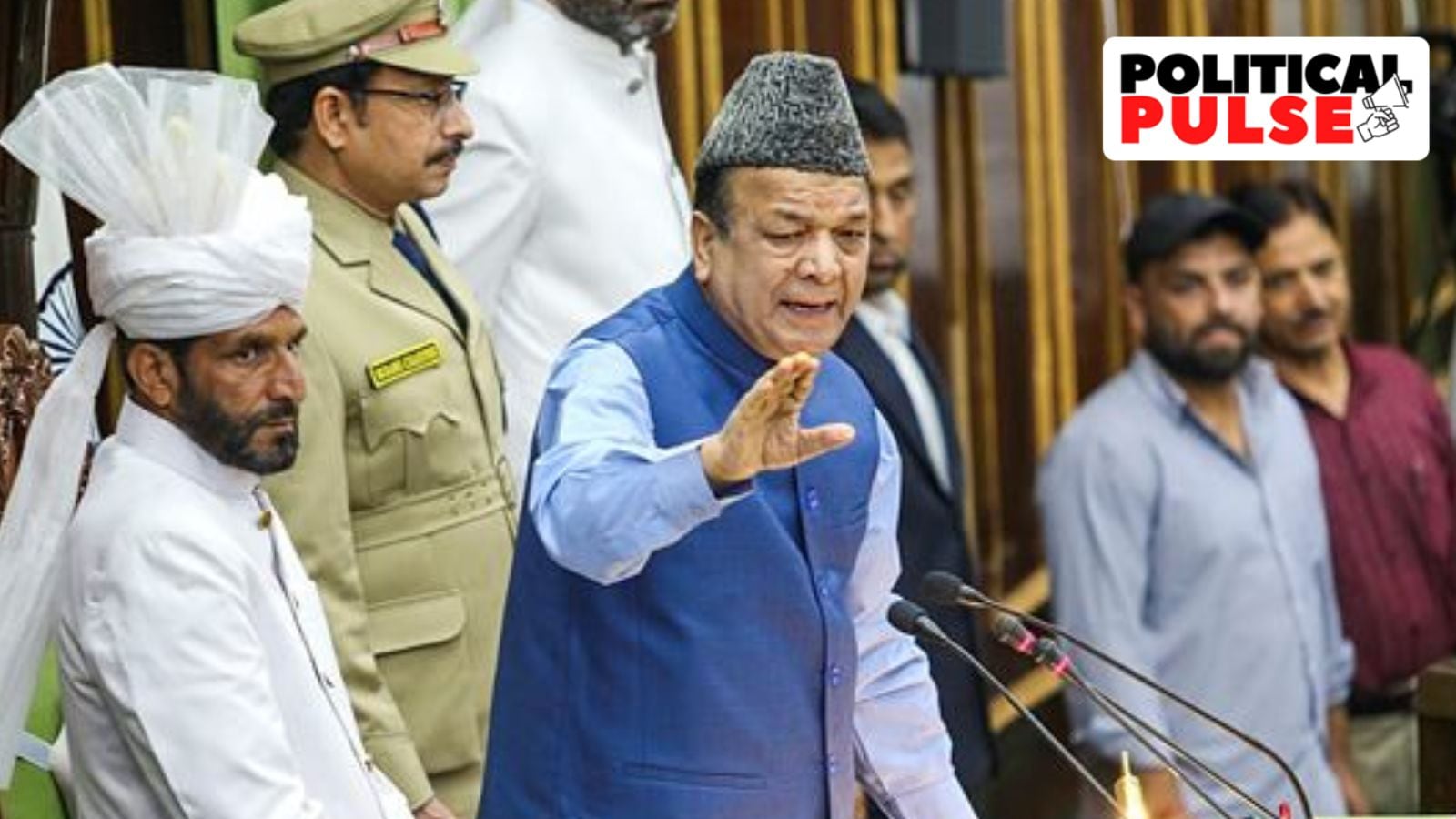 |
|
Abdul Rahim Rather, a seasoned politician and the Speaker of the Jammu and Kashmir Assembly, finds himself at the center of a significant political storm. The situation is unique because both the Treasury and Opposition Benches appear united in their dissent against him. The core of the issue revolves around Rather's decision to block notices for an adjournment motion aimed at discussing the Waqf Act, a law passed by the Parliament of India. This decision has ignited a firestorm of criticism, culminating in a motion of no-confidence moved against the Speaker by several Opposition legislators. Their most damaging accusation is that Rather is acting in collusion with the government, effectively stifling debate and preventing the Assembly from addressing crucial issues that could potentially embarrass the Omar Abdullah administration. These issues include not only the Waqf Act but also private member Bills seeking an alcohol ban, legislation concerning land ownership, and multiple Bills advocating for the restoration of statehood to Jammu and Kashmir.
Rather vehemently denies these allegations, expressing his pain and dismay at the accusations leveled against his integrity. He maintains that his decisions were made after careful consideration and in accordance with Assembly rules. He emphasizes that the entire country is watching, and he is committed to upholding legal and constitutional provisions to avoid any humiliation or criticism of the Assembly. Regarding the protests against him, Rather appeals to members to respect the Speaker, asserting that he holds all MLAs in high regard, irrespective of their party affiliation. His long and distinguished career in politics adds weight to his words. He is a senior member of the National Conference (NC), a party he has been associated with since its inception under Sheikh Mohammad Abdullah. Rather's extensive experience and deep understanding of Jammu and Kashmir's political landscape make the current controversy all the more significant.
A law graduate from Aligarh Muslim University, Rather's political journey began in 1977 when he was first elected to the Assembly from his native Charar-e-Sharif seat. He represented this constituency for six consecutive terms, establishing himself as a prominent figure in the region. However, in 2014, he faced his first electoral defeat when Ghulam Nabi Lone of the Peoples Democratic Party (PDP) won the seat by a margin of over 5,000 votes. In the subsequent elections, held after the abrogation of Article 370, Rather successfully reclaimed the Charar-e-Sharif constituency, defeating Lone. Given his seniority and two previous terms as Finance Minister, there was speculation that Rather would be appointed as a minister in the new government. However, Omar Abdullah's cabinet had limited positions, and other senior leaders like Ali Mohammad Sagar and Mubarak Gul also vying for a place. As a result, Rather was not included in the cabinet. The Speaker's position was then seen as a fitting reward for his long-standing loyalty and service to the party.
His legislative experience was expected to be invaluable in navigating the complex political landscape of Jammu and Kashmir and ensuring the smooth functioning of the Assembly. However, his refusal to admit the Waqf motion, originally moved by the NC itself on Monday and subsequently rejected, marked a turning point and has been just one in a series of controversial decisions made in his role. From the very beginning of his tenure as Speaker, Rather has faced criticism from the Opposition for consistently disallowing adjournment motions, resolutions, and Bills. This pattern of rejection has fueled the accusations of bias and collusion with the government.
Regarding the Waqf Act adjournment motion, Rather justified his decision by stating that the matter was sub-judice and that it did not directly concern the state government. He argued that petitions against the Waqf Act were yet to be formally admitted by the Supreme Court and reiterated the principle that the Assembly should not interfere in matters under judicial consideration. He also contended that the Waqf Act, being a law passed by the Parliament of India, was beyond the purview of the state government. However, the Opposition vehemently contested both of these arguments. They pointed out that while petitions had been filed against the Waqf Act, they had not yet been officially admitted by the Supreme Court, suggesting that the matter was not yet truly sub-judice. They also drew a comparison to a previous instance where a Bill against the new reservation policy was taken up for consideration despite a case being pending in court.
Furthermore, the Opposition challenged Rather's assertion that the Waqf Act did not concern the state government. They argued that the elected members of the Assembly were responsible for representing the concerns and interests of the people of Jammu and Kashmir, and that if the Waqf issue was of concern to the members, it was also of concern to the government. Deputy Chief Minister Surinder Choudhary echoed this sentiment, stating that the government was chosen by the people and that the members were elected by the people, implying that the government should address issues of concern to the elected representatives. Rather's response to this argument was that the Assembly could not undo what Parliament had done, suggesting that the state government's power to influence central legislation was limited. However, this response further fueled the Opposition's perception that the Speaker was prioritizing the interests of the central government over the concerns of the people of Jammu and Kashmir. The ongoing conflict highlights the complex and often contentious relationship between the state of Jammu and Kashmir and the central government, as well as the challenges faced by the Speaker in navigating these complexities while maintaining impartiality and upholding the principles of democracy.
